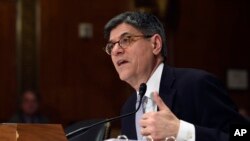U.S. Treasury chief Jacob Lew called Monday for the United States to maintain its global economic leadership, making sure that emerging economies around the world adhere to the cooperative efforts to resolve crises that have been in place since the end of World War II.
"If we want it to work for the American people, we need to embrace new players on the global economic stage and make sure they meet the standards of the system we created, and that we have a strong say in any new standards," he told the Council on Foreign Relations in Washington.
"The worst possible outcome would be to step away from our leadership role and let others fill in behind us," he added.
Lew said the United States and China, as the world's two largest economies, "have a unique responsibility to work together to advance shared prosperity, maintain a constructive global economic order, and make progress on critical challenges like climate change."
Lew did not mention the current U.S. presidential campaign, in which both the leading Democratic contender, former Secretary of State Hillary Clinton, and the Republican front-runner, real estate mogul Donald Trump, have attacked overseas trade deals negotiated by President Barack Obama, who leaves office next January.
But Lew denounced political gridlock in Washington.
"Political brinksmanship led some to question America's capacity to meet this moment of leadership," he said. "The threat of government shutdowns and default heightened global anxieties. And Washington's inability to reach a consensus on domestic priorities such as rebuilding aging infrastructure and reforming the broken business tax code, priorities with bipartisan support, creates unnecessary risks to America's future economic strength."
International cooperation
He said, however, that cooperation among nations across the world "was a major reason that the global financial crisis [in 2008] never turned into a second Great Depression." He said the United States and other countries, coordinating efforts through the group of 20 leading economies and the International Monetary Fund, avoided "the downward spiral of protectionism and predatory ... policies that characterized previous eras. The world's major economies, the United States, the eurozone, Japan, and China, launched simultaneous economic stimulus programs and mobilized financial assistance to vulnerable parts of the global system."
Lew said international cooperation has proved useful to U.S. interests in recent years, including the IMF response to fiscal stress caused by the Ebola epidemic in 2014 and support for Ukraine, following Russia's takeover of Crimea.
"The scale and speed of assistance in both instances would not have been possible if the United States had to act alone or stitch together donor contributions,” Lew said.
"The simple fact is that international financial institutions amplify U.S. influence on the global stage."
He said that global compacts forged toward the end of World War II "have produced the greatest gains in living standards in history," quadrupling per capita income since 1950. He said the accords provided "a foundation for mutual economic gains that would not have been achievable by individual countries acting on their own."
